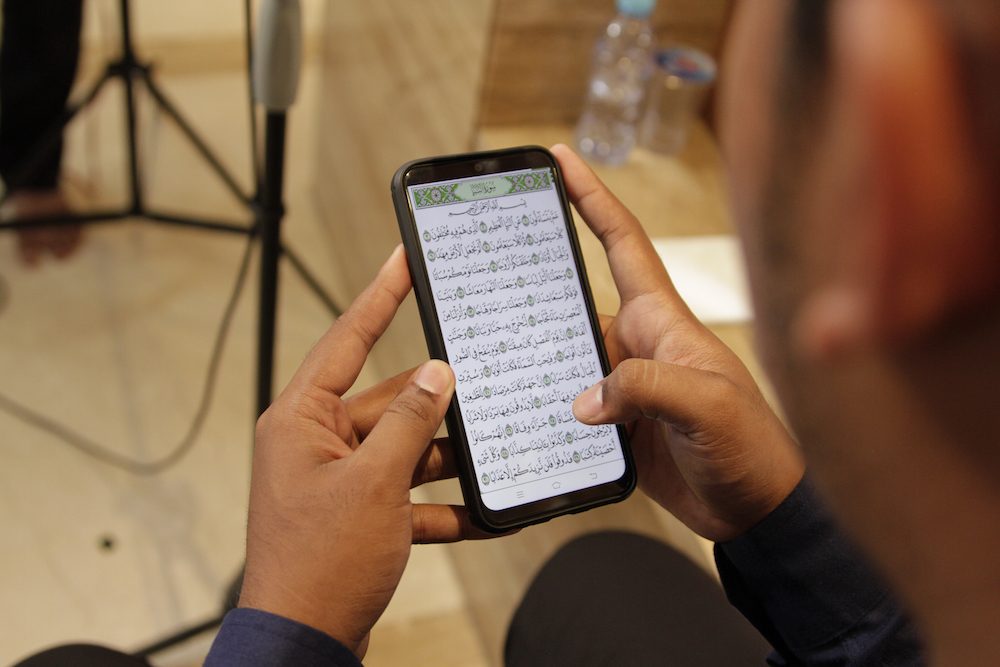
Qasim Choudhary, USA
Recently, a peculiar headline has been making an appearance on our social media and news feeds stating the following:
‘Young Americans are picking up the Qur’an to understand the resilience of Muslim Palestinians’[1]
Among these young people is Megan B Rice, a woman from Chicago, who began reading the Holy Qur’an, the religious scripture of Islam, on TikTok and subsequently chose to embrace Islam, citing the alignment of the Qur’anic narrative with her own core belief system.
As a Muslim, witnessing individuals outside of the faith turning to the Holy Qur’an for guidance and answers, particularly in the context of the distressing events in Palestine, is truly inspiring but not surprising. The founder of the Ahmadiyya Muslim Community, Hazrat Mirza Ghulam Ahmad (as), touched upon this phenomenon, recognising a profound prophecy within the word Qur’an. He articulated,
‘The prophecy is that this book alone is the Qur’an, i.e., a book that is worthy of being recited, and there will be a time when this will be the case even more so than before.’[2]
The present era exemplifies society’s growing interest in and turn towards Qur’anic guidance.
At this juncture, I would like to share a few verses from the Holy Qur’an that can offer deeper insights into the trials faced by the Palestinians. Despite the atrocities and cruelties that they are facing, they exhibit remarkable resilience and even find the strength to smile. Allah the Almighty states in the Holy Qur’an,
‘And We will try you with something of fear and hunger, and loss of wealth and lives, and fruits; but give glad tidings to the patient,
Who, when a misfortune overtakes them, say, “Surely, to Allah we belong and to Him shall we return.”
It is these on whom are blessings from their Lord and mercy, and it is these who are rightly guided.’[3]
When faced with extreme difficulty and pain, a natural question arises, ‘Why is God testing us? Why are we subjected to such brutal and inhuman treatment?’
To answer this question, let’s reflect on the nature of trials and tribulations, drawing a parallel to a familiar situation – school examinations. Why do educators test us? Simply put, they want to gauge our performance, see how attentive we have been, and help us reflect, improve, and grow. Exams point out our deficiencies, allowing us to work on ourselves.
Similarly, in the spiritual realm, individuals face tests and tribulations typically for two primary reasons. The Second Worldwide Head of the Ahmadiyya Muslim Community, Hazrat Mirza Bashiruddin Mahmood Ahmad (ra), elucidating on these reasons, mentions,
- For believers of lower faith, it acquaints them with the condition and level of faith they possess. The purpose is to make them aware of their weaknesses so that they may strive to improve their condition.[4]
- Believers of higher faith are tested to bring them to the notice of the people and make them shine as models of virtue and purity.[5]
An intriguing aspect of human behavior is our capacity or rather incapacity, to accurately gauge our competence. David Dunning, a distinguished professor of psychology, highlights human beings often overestimate themselves and truly believe it.[6] This tendency of overestimation can be observed in matters of faith as well.
Commenting on the Qur’anic verses cited above, Hazrat Mirza Bashiruddin Mahmood Ahmad (ra) states,
‘Generally, people perceive that they are steadfast and firm in their faith, however, in the face of trial they manifest weakness. They become cognizant of their deficiency and work towards removing it and gradually (by way of this process) they attain perfection. However, trials are brought upon people of high rank to demonstrate to others how they have reached such an elevated status that no calamity disturbs their steadfastness.’[7]
Refocusing on the second reason for trials, the resilience and strength of Palestinians serve as inspiration for us all. This sentiment has been beautifully expressed by the Fifth Caliph and current Worldwide Head of the Ahmadiyya Muslim Community, His Holiness, Hazrat Mirza Masroor Ahmad (aba),
‘Observe the children in Palestine and the cruelties they are enduring due to war, yet they don’t have fear. When their pictures circulate you see them smiling and laughing. Thus, there should be no fear within you, rather you should be courageous.’[8]
Therefore, the trials and tribulations we face in life provide an opportunity for spiritual reformation and purification. They also serve as a powerful reminder to the world that our faith is unshakeable and that with prayer, patience, and a smile, we shall overcome even the most harrowing circumstances.
About the Author: Qasim Choudhary is a graduate of the Ahmadiyya Institute of Languages and Theology in Canada, and serves as an Imam of the Ahmadiyya Muslim Community in the United States of America.
ENDNOTES
[1] https://www.theguardian.com/books/2023/nov/20/palestine-quran-islam-americans-tiktok
[2] Malfuzat, Vol 3, p.10 [Eng. Translation]
[3] The Holy Qur’an, 2:156-158
[4] The Five-Volume Commentary, Under 2:156, footnote No.162
[5] Ibid
[6] https://www.apa.org/monitor/feb03/overestimate
[7] Tafsir-e-Kabir Vol.3 p.57
[8] Virtual Meeting 12 November, 2023 Waqfieen-e-nau Belgium




Add Comment